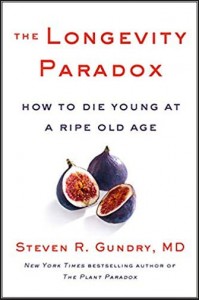How To Die Young at a Ripe Old Age


 From the moment we are born, our cells begin to age. But aging does not have to mean decline. World-renowned surgeon Dr. Steven Gundry has been treating mature patients for most of his career. He knows that everyone thinks they want to live forever, until they hit middle age and witness the suffering of their parents and even their peers. So how do we solve the paradox of wanting to live to a ripe old age—but enjoy the benefits of youth?
From the moment we are born, our cells begin to age. But aging does not have to mean decline. World-renowned surgeon Dr. Steven Gundry has been treating mature patients for most of his career. He knows that everyone thinks they want to live forever, until they hit middle age and witness the suffering of their parents and even their peers. So how do we solve the paradox of wanting to live to a ripe old age—but enjoy the benefits of youth?
This groundbreaking book holds the answer. Working with thousands of patients, Dr. Gundry has discovered that the “diseases of aging” we most fear are not simply a function of age; rather, they are a byproduct of the way we have lived over the decades. In his new book, The Longevity Paradox, he maps out a new approach to aging well—one that is based on supporting the health of the “oldest” parts of us: the microorganisms that live within our bodies.
Our gut bugs—the bacteria that make up the microbiome—largely determine our health over the years. From diseases like cancer and Alzheimer’s to common ailments like arthritis to our weight and the appearance of our skin, these bugs are in the driver’s seat, controlling our quality of life as we age.
The good news is, it’s never too late to support these microbes and give them what they need to help them—and you—thrive. In The Longevity Paradox, Dr. Gundry outlines a nutrition and lifestyle plan to support gut health and live well for decades to come. A progressive take on the new science of aging, The Longevity Paradox offers an action plan to prevent and reverse disease as well as simple hacks to help anyone look and feel younger and more vital.
 There are plenty of myths out there that The Longevity Paradox sets straight. Some examples include:
There are plenty of myths out there that The Longevity Paradox sets straight. Some examples include:
- LONGEVITY MYTH #1 — ANIMAL PROTEIN MAKES YOU STRONGER –For decades, you’ve been sold on animal protein. The truth is, animal protein actually makes you weaker. Not only that, but it could potentially be shortening your life. In fact, lifestyles that focus on lower meat consumption are often associated with greater longevity. Many Western societies vastly over-consume animal protein — this leads to higher blood sugar levels, obesity, and shorter life spans in general. Dr. Gundry suggests eating grass-fed, pasture-raised meat only once or twice weekly. These include bison, wild game, venison, boar, elk, pork, lamb, beef, and prosciutto.
- LONGEVITY MYTH #2 — FASTER METABOLISM = LONGER LIFE– The latest studies reveal that, although occasional increases in metabolic rate due to exercise are beneficial, a constantly higher metabolism may be harmful and lead to early mortality. So, the truth is, a lower metabolic rate is actually better for your health. As Dr. Gundry says in The Longevity Paradox: It’s better to be a Prius than a Maserati. Don’t you want to be a more efficient fuel burner? Get 50 miles to the gallon instead of only 19? Makes sense, doesn’t it?
 LONGEVITY MYTH #3 — FAT IS BAD– The truth isn’t all fat is bad. The truth is… ANIMAL FAT is bad. Monounsaturated fats, like olive oil, can be amazing for your overall longevity and are great for your cognitive health. Olive oil is full of polyphenols that protect against heart disease, cognitive decline, Alzheimer’s, and neurological inflammation. It’s the saturated fats, like bacon or sausage, that are part of the greater problem. Dr. Gundry’s approved list of animal fat A2 Milk, Ghee, Goat butter, Grass-fed French butter and Grass-fed Italian butter.
LONGEVITY MYTH #3 — FAT IS BAD– The truth isn’t all fat is bad. The truth is… ANIMAL FAT is bad. Monounsaturated fats, like olive oil, can be amazing for your overall longevity and are great for your cognitive health. Olive oil is full of polyphenols that protect against heart disease, cognitive decline, Alzheimer’s, and neurological inflammation. It’s the saturated fats, like bacon or sausage, that are part of the greater problem. Dr. Gundry’s approved list of animal fat A2 Milk, Ghee, Goat butter, Grass-fed French butter and Grass-fed Italian butter.
The paradox of longevity comes down to this: No one’s getting out alive. But you can die young at a ripe old age by assembling the right team. Or, perhaps more accurately, by assembling a village of trillions of inhabitants who want only one thing, and that is to preserve their beautiful home.